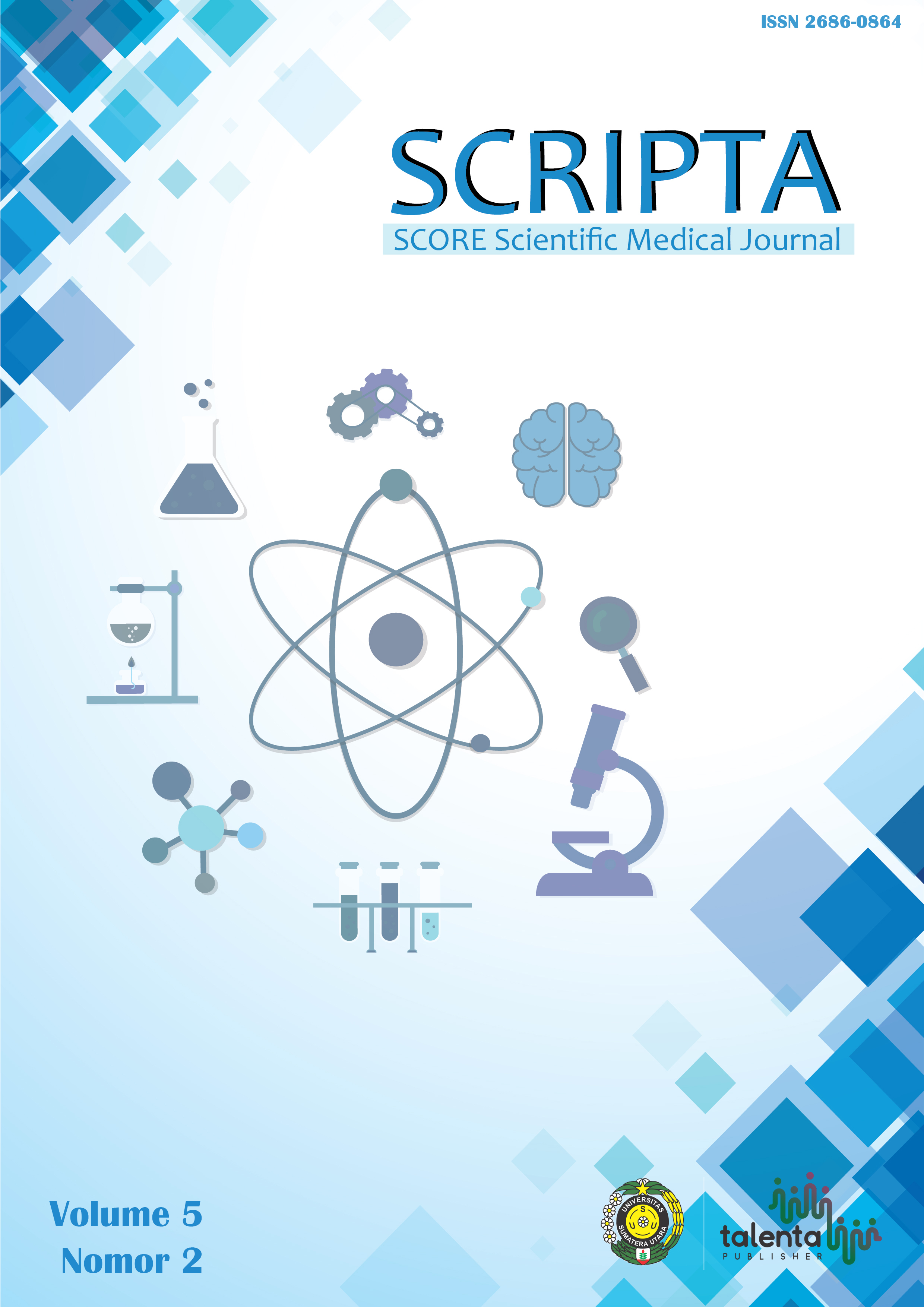The Relationship of Apolipoprotein B and Major Adverse Cardiovascular Events (MACE) in Patients with Coronary Heart Disease as a Prognostic Factor: A Literature Review
DOI:
https://doi.org/10.32734/scripta.v5i2.15234Keywords:
Apo-B, coronary, heart, MACE, prognosis, koroner, jantungAbstract
Background: All lipoproteins containing Apo-B contribute to the risk of major adverse cardiovascular events (MACE). Although low-density lipoprotein cholesterol (LDL-C) is the most common marker to assess the risk associated with dyslipidemia, Apo-B levels reflect excess atherosclerotic risk and proatherogenic shifts in lipoprotein, predict the risk of incidental atherosclerotic cardiovascular disease, MACE following ACS, including mortality compared to LDL-C. Objectives: This review is held to examine the clear association between Apo-B with MACE in patients with coronary heart disease. Methods: Studies examining the relationship between Apo-B and MACE in coronary heart disease published in 2018-2023 are searched comprehensively using advanced search on PubMed, Google Scholar, and Cochrane. The relevant studies in Indonesian or English are included and qualitatively reviewed. Result and Discussion: There are 17,392 studies identified, four of which meet the inclusion criteria and have low risks of bias in most domains. Study indicates Apo-B levels are significantly associated with the long-term risk of MACEs, especially in patients with comorbidities. After primary PCI, high Apo-B levels predict a greater and significant incidence of MACE compared to LDL-C and non-HDL-C. Apo-B reduction also triggers a significant decrease in MACE, unlike non-HDL-C control. Hence, lipid therapy after ACS should focus on Apo-B. Low Apo-B correlates with malnutrition, old age, comorbidities thus indicating a worse prognosis for ACS. Therefore, identification of comorbidities should be considered. Conclusion: This review provides strong evidence that Apo-B level has better prognostic information of MACE following coronary heart disease, especially in patients with comorbidities, compared to other lipid profiles. Therefore, controlled Apo-B is preferred as a therapy target.
Keyword: Apo-B, coronary, heart, MACE, prognosis
Â
Latar Belakang: Semua lipoprotein yang mengandung Apo-B berkontribusi terhadap risiko kejadian kardiovaskular utama yang merugikan (MACE). Meskipun kolesterol lipoprotein densitas rendah (LDL-C) adalah penanda yang paling umum digunakan untuk menilai risiko yang terkait dengan dislipidemia, kadar Apo-B mencerminkan risiko aterosklerotik berlebih dan pergeseran proaterogenik dalam lipoprotein, memprediksi risiko penyakit kardiovaskular aterosklerotik insidental, MACE setelah sindrom koroner akut (ACS), termasuk kematian dibandingkan dengan LDL-C. Tujuan: Tinjauan ini bertujuan menelaah hubungan yang jelas antara Apo-B dengan MACE pada pasien dengan penyakit jantung koroner. Metode: Studi yang meneliti hubungan Apo-B dengan MACE pada pasien penyakit jantung koroner dan dipublikasikan pada 2018-2023 dicari secara komprehensif menggunakan metode pencarian lanjut di Pubmed, Google Scholar, dan Cochrane. Studi yang relevan dalam bahasa Indonesia atau Inggris diinklusi dan ditelaah secara kualitatif. Pembahasan: Dari 17.392 studi yang teridentifikasi, sebanyak 4 studi sesuai dengan kriteria inklusi serta memiliki risiko bias rendah pada mayoritas domain. Studi menunjukkan bahwa kadar Apo-B secara signifikan berhubungan dengan risiko MACE jangka panjang, terutama pada pasien dengan komorbiditas. Setelah PCI primer, kadar Apo-B tinggi memprediksi insiden MACE yang lebih besar dan signifikan dibandingkan LDL-C dan non-HDL-C. Penurunan Apo-B memicu penurunan MACE signifikan, berbeda dengan non-HDL-C. Oleh karena itu, terapi lipid setelah ACS sebaiknya berfokus pada Apo-B. Kadar Apo-B rendah berkorelasi dengan malnutrisi, usia tua, komorbiditas sehingga menunjukkan prognosis yang lebih buruk untuk ACS. Oleh karena itu, identifikasi komorbiditas dipertimbangkan. Kesimpulan: Telaah ini memberikan bukti kuat bahwa kadar Apo-B menyediakan informasi prognostik MACE lebih baik setelah penyakit jantung koroner, terutama pada pasien dengan komorbiditas, dibandingkan dengan profil lipid lainnya. Oleh karena itu, pengendalian Apo-B lebih dipilih sebagai target terapi.
Kata Kunci: Apo-B, koroner, jantung, MACE, prognosis
Downloads
Downloads
Published
How to Cite
Issue
Section
License
Copyright (c) 2024 Andrea Radyaputri

This work is licensed under a Creative Commons Attribution-NonCommercial 4.0 International License.
Authors who publish with SCRIPTA SCORE Scientific Medical Journal agree to the following terms:
- Authors retain copyright and grant SCRIPTA SCORE Scientific Medical Journal right of first publication with the work simultaneously licensed under a Creative Commons Attribution-NonCommercial License that allows others to remix, adapt, build upon the work non-commercially with an acknowledgment of the work’s authorship and initial publication in SCRIPTA SCORE Scientific Medical Journal.
- Authors are permitted to copy and redistribute the journal's published version of the work non-commercially (e.g., post it to an institutional repository or publish it in a book), with an acknowledgment of its initial publication in SCRIPTA SCORE Scientific Medical Journal.














